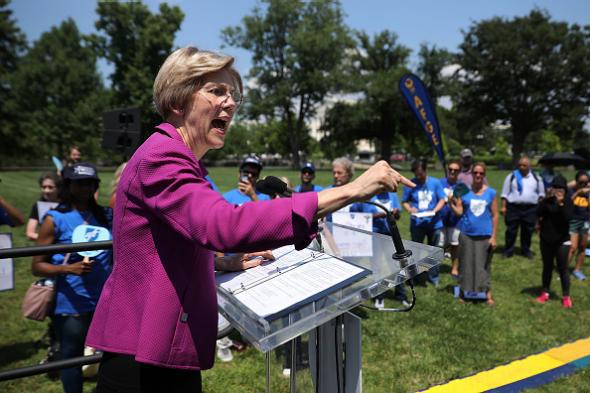There has been a great deal written and said, in the wake of a certain 2016 presidential election result, about what Democrats need to do to attain more power than they currently have, which is none. (No power whatsoever!) On Monday, with an eye toward 2018, party leaders announced their first big stab at the problem—the “Better Deal” agenda, introduced via a Times op-ed by Senate Minority Leader Chuck Schumer and a press conference in Virginia.
The takeaway: Democrats are going to talk a lot about how working- and middle-class incomes have stagnated as the costs of housing, health care, education, and everything else have continued to increase. (It’s “an economy that has created enormous accumulated wealth for wealth holders while producing less work and less pay for workers,” Schumer said in Virginia, judiciously choosing not to mention his own record of support for wealth-holding.) And in addition to supporting methods of raising wages such as, uh, raising the minimum wage, they’re also going to target a particular set of villains on the “costs” side of the equation—price-gouging pharmaceutical companies, inept cable conglomerates, and other maddeningly inhumane monopolies. From Schumer’s speech:
Right now our antitrust laws are designed to allow huge corporations to merge, padding the pockets of investors but, sending costs skyrocketing. For everything from cable bills and airline tickets to food and health care. Nothing bothers average folks more than the cable bill or airline fee that just keeps going up—because there are so few competitors in the industry, sometimes only one or two. Old fashioned capitalism has broken down to the detriment of consumers. Adam Smith has lost his way amidst these big corporations. Large corporations, in too many instances, merge for their own interests so they—not the consumer—can dictate prices, the quantity, and the quality of goods.
The “Better Deal” website has a section about “cracking down on corporate monopolies and the abuse of economic and political power,” which promises not just to make sure that “Wall Street never endangers Main Street again” but also to address issues like credit card fees, charges for using overhead bins, and “a United Airlines overbooking policy that led to the brutal assault of an airline passenger.”
Business Insider wonk Josh Barro noted in June that this kind of approach—one advocated by Massachusetts Sen. Elizabeth Warren, who was at the Virginia press conference—could be a smart way for the party to actually address large-scale economic problems without turning off more cautious voters who aren’t prepared to get on board with full Bernie-style socialization:
Instead of proposing to tax a small slice of rich people to give subsidies to poor to lower-middle-income people, or proposing to tax everyone to have the government take over sectors of the economy, what if Democrats ran on fixing broken markets so middle-income people could afford to buy more of the things they need in their daily lives — with their own earnings?
It’s a message that squares the American belief in values like scrappy self-sufficiency and fair competition with the reality that unsupervised capitalism may not always be the best way to promote those values. If you couldn’t tell, I think it’s smart! And folks, I’m a news blogger! Maybe this “better deal” will work better than the one Hillary Clinton proposed in 2015.
